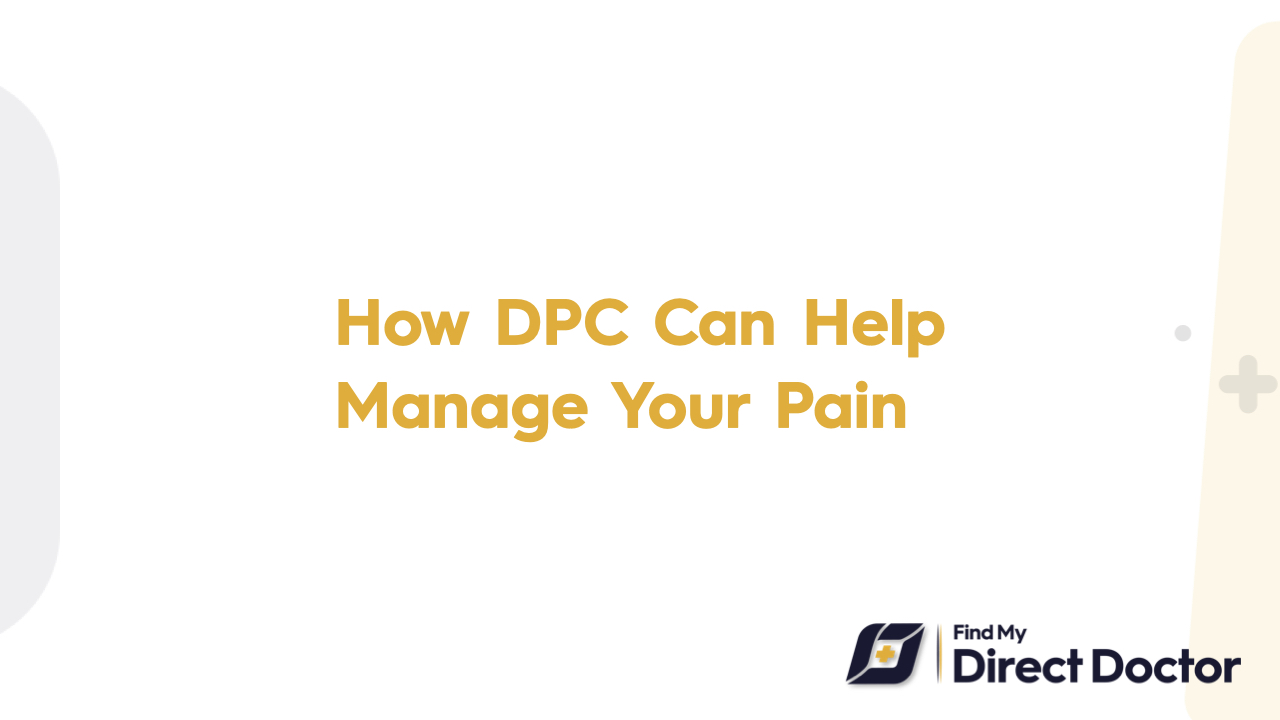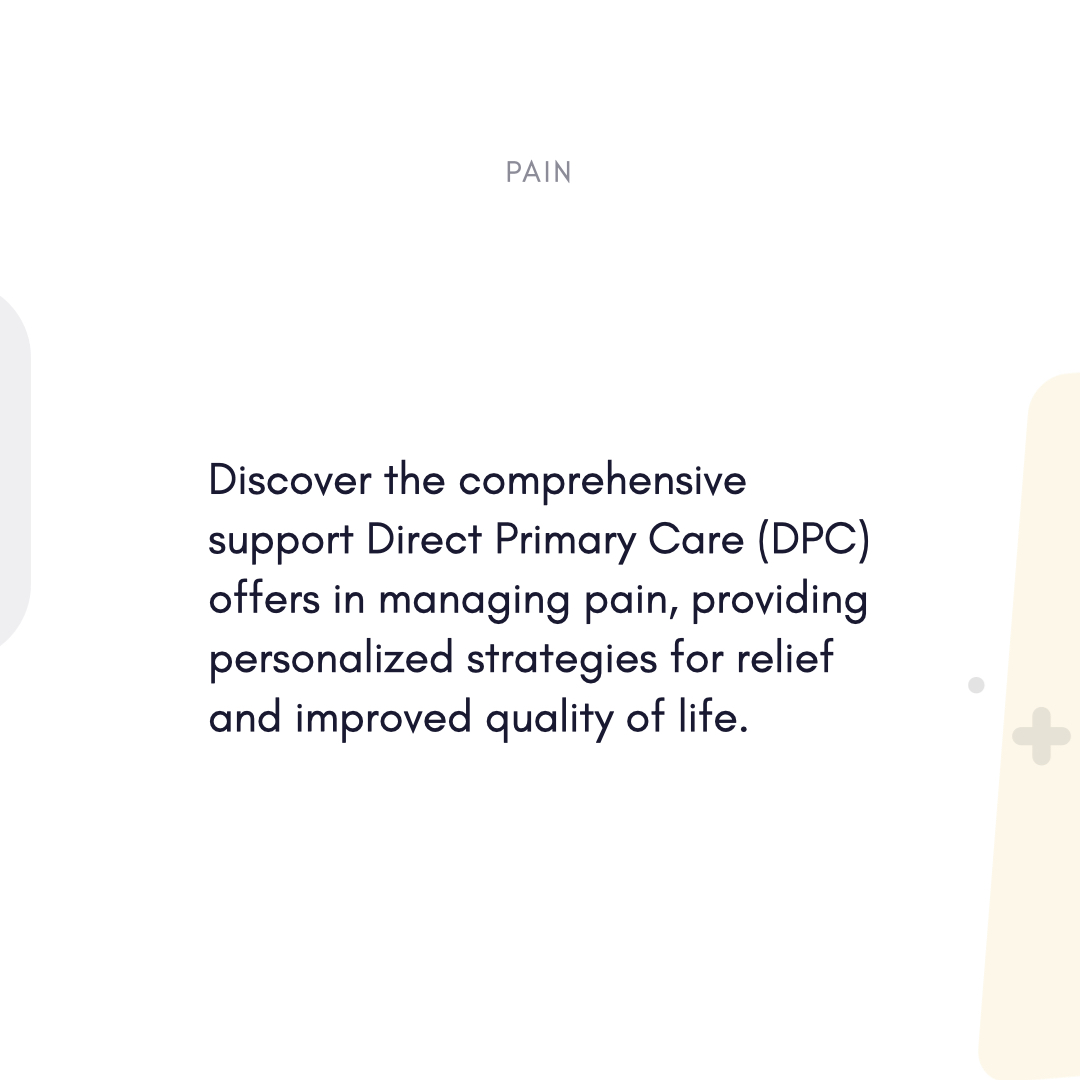Chronic Pain and Direct Primary Care (DPC): Personalized Relief Without the Red Tape
A life governed by narcotics. Never-ending waits for referrals to experts. More than 50 million Americans with chronic pain know—a labyrinth of disjointed treatment where relief seems just out of reach. Many times, traditional medicine treats pills above underlying causes, so trapping patients in cycles of pain. Direct Primary Care (DPC) redefines pain management with unlimited access, customized strategies, and a partnership targeted on your well-being, though.

Appreciating Chronic Pain
Usually surpassing its original source (e.g., injury, arthritis, neuropathy), chronic pain lasts for three plus months. It may show itself as:
- Localized suffering: Back, neck, or joint discomfort
- Burning, tingling, or shooting pain—neuropathic pain
- Migraines or fibromyalgia: Systemic suffering
Why does conventional treatment not work?
- Hurried visits causing a misdiagnosis
- Overindulgence in opioids without tackling underlying causes
- Physical therapy delays or specialized referral delays
Though many patients never get non-pharmacologic therapies, the American College of Physicians (ACP) advocates for them as first-line treatments.
How DPC Changes Managing Pain
Operating under a membership model usually 50–150 USD/month, Direct Primary Care (DPC) provides unlimited consultations, same-day visits, and clear pricing. This translates for pain sufferers into no co-pays, no prior authorizations, and a care plan tailored to your suffering.
1. Quick Access to Therapies Using Multiple Modalities
The accessible model of DPC allows for same-day flare-up or new symptom evaluations.
- Individualized treatment programs: Combining drugs— NSAIDs, gabapentin—physical therapy, acupuncture, or cognitive behavioral therapy (CBT).
- Images and labs: reasonably priced MRIs, nerve conduction studies, or inflammation panels sold wholesale.
2. Customized, Patient-Centered Treatment
DPC doctors visit for thirty to sixty minutes to:
- Find root causes: Is it centralized pain, an autoimmune problem, a pinched nerve?
- Work towards shared objectives: Cut painkillers, increase mobility, or get back to sleep.
- Blend experts: Work with pain clinics, chiropractors, or neurologists to coordinate discounted cash pricing.
3. Comprehensive, Economical Support
DPC lowers emotional and financial burden by cutting drug prices:
- For compounded creams or generics, wholesale pricing.
- Stopping ER visits: 24/7 telehealth help to control flares at home.
- Integrating mental health into daily life: Therapy for anxiety and depression connected to ongoing pain.
DPC Advantages for Pain Suffering Patients
1. Unmatched Approachability
- 24/7 urgent concern text/phone access from a provider.
- Not waiting for PT referrals or trigger point injections.
2. Individualized Plans Supported by Science
- Strategies oriented toward ACP alignment: Giving exercise, mindfulness, or nerve blocks top priority ahead of opioids.
- Integration of lifestyle: yoga programs, sleep hygiene, anti-inflammatory diets.
3. Open Cost: Affordability
- Membership covers basic procedures (such as joint injections) as well as consultations and care coordination.
- Typical savings: 1,200+ USD yearly against insurance co-pays and specialized fees.
Personal Success Stories from Real Life
- Case 1: Marcus, 45, struggled with lower back discomfort for years depending on opioids. His DPC doctor arranged cash-pay physical therapy after ordering an MRI that turned up a herniated disc. He cut off opioids, recovered mobility with spinal stretches, and today hikes pain-free.
- Case 2: Lena, 52, with fibromyalgia encountered dismissive doctors. Her DPC provider linked her with a mindfulness app, taught pacing techniques, and prescribed low-dose naltrexone. In three months her pain ratings dropped by half.
Frequencies: DPC and Chronic Pain
- DPC can manage complicated conditions including neuropathy or CRPS?
- A: Absolutely. Often at self-pay discounts, DPC doctors coordinate with pain experts to create multimodal plans including spinal cord stimulators or ketamine treatment.
- Q: For long-term pain control, is DPC reasonably priced?
- A: Right away. Members save by cutting ER visits, imaging mark-ups, and 100+ USD specialist co-pays.
- Q: What would happen if I wanted non-drug therapies?
- A: DPC gives your preferences top priority; common choices are medical massage, PEMF treatment, and acupuncture.
Why DPC Benefits Pain Suffering Patients
Emphasizing DPC's congruence with ACP recommendations, the American Academy of Family Physicians supports:
- Early intervention can help to prevent acute pain from turning chronic.
- Tools to monitor symptoms, create functional goals, and cut dependence on opioids help empower you.
- Trust: Transactional visits are replaced in a patient-doctor relationship that lasts.
Get Out of the Pain Cycle.
You need not define yourself with chronic pain. DPC helps you to find a partner who fights for your right to live fully—every day, listens carefully, and innovates constantly.






